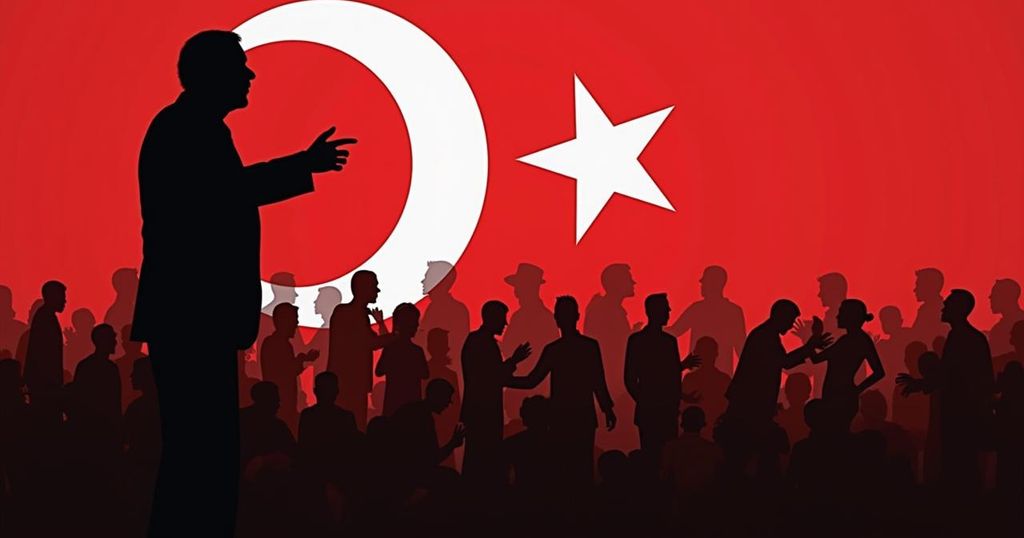Tunisia: Saied Moves Toward Second Term Amid Controversial Elections
Kais Saied is poised to win a second term in Tunisia’s presidential election, despite allegations of a lack of electoral integrity and the exclusion of serious challengers. An exit poll indicated he received 89.2% of votes with a turnout of only 28%—the lowest since the 2011 revolution. Prominent opposition figures remain imprisoned or barred from the election, raising concerns about political repression amid ongoing economic difficulties.
On Sunday evening, as polls closed in Tunisia’s presidential elections, incumbent President Kais Saied appeared set to secure a second term in office, facing criticism from opposition leaders who contended that the electoral process lacked credibility and integrity. Controversially, Saied’s main competitors were barred from participating in the election; one of his adversaries, Ayachi Zammel, is currently imprisoned. The initial exit polls from the election, broadcast on public television, indicated that Saied garnered approximately 89.2% of the vote, but the voter turnout registered at a mere 28%, the lowest since the 2011 revolution. The candidates opposing Saied included former lawmaker Zouhair Maghzaoui, who initially supported Saied’s consolidation of power in 2021 but later chose to run against him. The exit poll suggested his support to be around 3.9%. Meanwhile, Zammel, who has gained a measure of popularity during his incarceration for alleged signature forgery related to his candidacy, was projected to receive about 6.9% of the vote. The election saw several noteworthy opposition leaders, such as Rached Ghannouchi of the Ennahdha party and Abir Moussi of the Free Destourian Party, either imprisoned or barred from the contest entirely by an electoral commission appointed by Saied himself. Prior to the election, the independent court previously responsible for adjudicating electoral disputes was stripped of its powers, raising further concerns regarding the electoral integrity. Tunisia’s political landscape, once seen as a beacon of democratic progress following the Arab Spring, has since regressed into a more autocratic regime under Saied’s leadership, characterized by significant political oppression. Human Rights Watch has reported the detention of over 170 individuals on political grounds since Saied took power. Saied’s governance has also been overshadowed by ongoing economic turmoil, with challenges such as shortages of basic goods, high inflation, and chronic unemployment. Despite high government debt levels, he remains reluctant to implement unpopular spending cuts, which are necessary to secure potential loans from the International Monetary Fund (IMF). Tunisia’s recovery efforts have relied on reviving tourism and receiving assistance from the European Union, contingent upon a crackdown on migration.
The political climate in Tunisia has deteriorated since the Arab Spring, an uprising that initially resulted in democratic reforms after the fall of former President Zine El Abidine Ben Ali in 2011. This recent election cycle serves as a stark reminder of the challenges facing Tunisia’s democracy, as the current President Kais Saied has taken steps to centralize power, including the suspension of parliament and rewriting the constitution. The ramifications of these actions have been widely criticized, leading to significant discontent among opposition factions. As Tunisia grapples with economic hardships, including inflation and shortages of essential goods, the political landscape remains tense and uncertain.
The recent presidential election in Tunisia illuminated the significant challenges facing the nation as incumbent President Kais Saied seems poised for reelection amid widespread allegations of electoral malfeasance and political repression. With crucial opposition leaders imprisoned or barred from participation, the integrity of the electoral process is under scrutiny. Furthermore, Saied’s handling of ongoing economic crises complicates the country’s road to recovery, underscoring the precarious balance between governance and democratic ideals in Tunisia’s current political landscape.
Original Source: www.dw.com




Post Comment